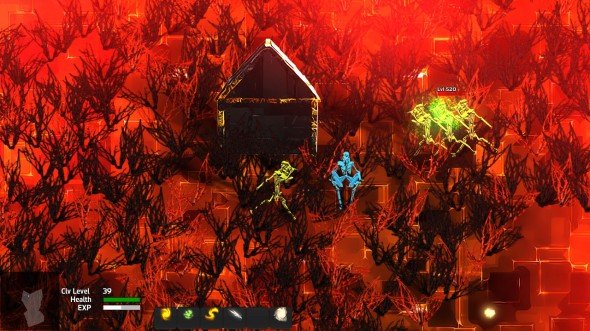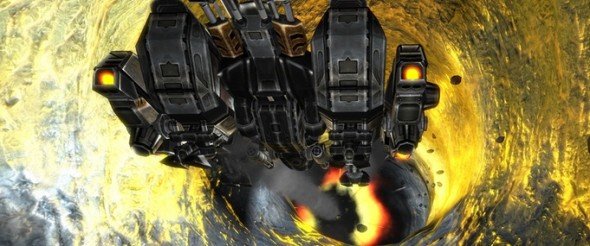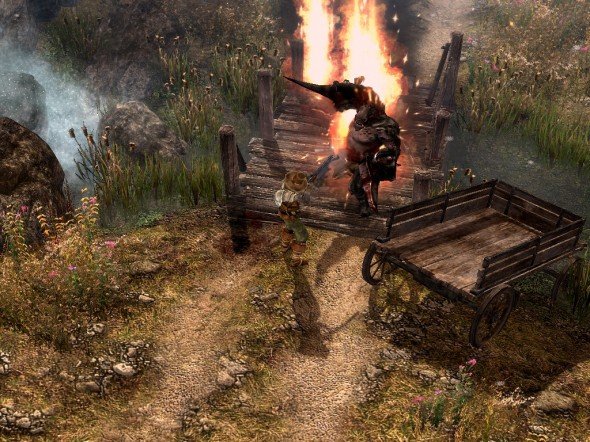The future of indie
A Valley Without Wind

This sounds a little bit like Minecraft: a procedurally generated RPG, where each world is unique to the player experiencing it. Except where Minecraft is about the player's impact on a mostly empty world, AVWW is a lot more involved.
A post-apocalyptic world where the apocalypse (an ice-age) might not have happened, the player's adventure takes him through the remnants of civilisation on a broken Earth, meeting the people left behind in office buildings and villages. Developers Arcen have some startling ambition, creating a game world without any boundaries: it'll go in any direction, generating challenges, characters and areas as the player explores. They claim it will never end, and that you'll never need to generate another world.
That openness is at the heart of the game. Everything you can see you can visit: every building will be open to the player, every settlement will have its own problems to help solve or avoid. Sounds intriguing.
Frozen Synapse

A strategy game obviously influenced by both X-Com and Counter-Strike, thoughtful unit placement and terrifying action mix it up in quickly resolved top-down battles.
The futuristic blueprint look is appropriate: it's more about the minute planning of your team's movement than anything else, where each turn is an exercise in precognition and careful consideration. You drag markers for distance, speed, direction and preparedness out of each soldier, with the other player's team and choice hidden until you cross each other's line of sight. Then your gibs hit the fan.
Keep up to date with the most important stories and the best deals, as picked by the PC Gamer team.
Of course, this all leads to panicky skirmishes: tense little pockets of fighting where your best laid plans explode in your face. Or should that be 'like your face'? That sniper you carefully sent to cover the corner is blasted point blank with a shotgun, while a cleverly planned pincer attack unravels when you realise the target is in another part of the map. So important is each turn that the fear of hitting the button that sets your moves in motion is scarier than any survival horror.
Miner Wars 2081

Space does funny things to game developers. The minute they start to conceive of a game where freedom of movement is key, they start jettisoning any notion of controlling the player.
MMO Miner Wars 2081 wants the players to go anywhere they want, and make an impact on their own terms. The tools it provides sets it apart from the usual Elite clone, though. You're the operator of an advanced mining ship, trying to carve a life out of the asteroids that lazily spin in the vacuum. Your ship is capable of burrowing through the giant rocks, with each of the vast hunks of mineral fully destructible.
It means the player is free to make a base of operations deep inside the heart of an asteroid, hollowing it out on the hunt for precious metals and setting traps on the walls to ensure your claim is well protected. Make a home there if you like: the universe around you will persist, so anyone carving a replica of their own genitals into the face of a giant rock will be giving the population of the system an eyeful, until someone takes offence and delivers a mining laser eraser to it. Right, Tim?
There's structure, of course. You can't put someone in the cockpit of a space ship and not ask them to escort weaker ships, explore and collect, steal cargo or defend bases from raiders. And the persistence applies to the ship as well, so you'll be upgrading your cockpit as you continue to burrow for precious materials to exploit and rocks to muck about with. That holy grail of Elite online is still hanging over every space sim that comes out, and it's been a while since a full-on live-your-life-in-space revved up to take a crack at it. This is one to watch.
Grim Dawn

Here's a lesson in recovery and openness. When old school action RPG studio Iron Lore (creators of the Titan Quest games) were closed, the core team took stock, took their ideas, took their engine and started on their (and their audience's) dream game, free of publisher interference, showcasing their progress in public at their forums. Airing their development so early in the production cycle is unusual, but has its advantages, and their forumites and fans are constantly suggesting improvements and additions.
Even small quality-of-life tweaks are picked over and analysed: from automatic gold pickup when out adventuring, to deeper and more complex conversations with quest givers and merchants. Even the smallest details get analysed and improved thanks to audience feedback. When an artist posted the first images of a new system to determine where the player could walk, forumites pointed out that a bridge didn't look quite right. Two hours later new screenshots appeared showing a newly tarted up bridge and path.
Super-fans also get to help fund the development. Pre-orders are already open on an escalating scale. Players can buy access into the early alpha and beta ahead of the eventual launch. Get involved in development at www.grimdawn.com . Just don't mention Diablo.

